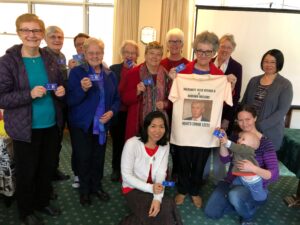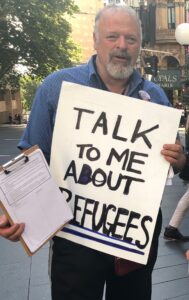Dignity and Shame.

There’s nothing very dignified about crucifixion. The indescribable pain would probably blot out the public ignominy of dying slowly as a naked criminal. Who would willingly put themselves in this place of shame? [1] Jesus did. Not to save us from an imaginary divine anger but to show us the end result of what we humans do to each other.
Who would willingly put themselves in the place of shame today? Mary MacKillop did in her day. She was with the poor, those oppressed by the powerful, the object of calumny, manipulation and intrigue. She recognised people’s fundamental rights and worked with them, championing their dignity, and in the process, claiming her own. “Of the Cross” has its own unique dignity, an inversion of the usual, a quelling of human violence from the inside.
The plight of the oppressed today must be drawn into our Christian soul, two responses could be: immediate aid to the suffering, and challenges to those wielding power.
Serious social ills which erode the dignity of people exist today and are no less confronting than those in earlier times. Australian society tolerates and even gains from the production and exclusion of non-persons. Those in power boast of the feat of “stopping the boats”. This triumph is accomplished partly by the deterrent of detaining a number of people who came to Australia by boat after a certain arbitrarily chosen date – 19 July 2013. Not one of those people has been charged with any crime against international or domestic law, yet some now detained under this regime have been there for seven years. They are innocent people who happened to approach Australia at the wrong time. The great majority are recognised as genuine refugees and have that status under international law, yet their only option for release is to return to the place of danger from which they escaped. Australia has even refused New Zealand’s offer to accept 150 of them per year. Those who claim the mantle of Mary MacKillop must ask: what would she think and do about this?
So many other assaults on human dignity exist in Australia. These affect, for example, the First Peoples, people on temporary protection visas, those suffering human trafficking, homelessness, child abuse, domestic violence, climate change, the recent fires, joblessness and Coronavirus. Many other threats to human dignity challenge our Australian response, among which the oppressed people of West Papua remain a singular weight on our collective conscience. As in Mary MacKillop’s time, glib answers to human problems can be made which generally amount to blaming those in distress––they should work harder, get a job, go back to where they came from, keep their mouths shut, she shouldn’t have married him, they’re bludgers, they must have done something wrong, etc., etc.

In Jesus’ case it was considered better for one to die than for the whole nation to face threat (John 11:50). This is the quintessential description of a scapegoat – the substitute sacrificed for the benefit of the dominant group. The very sacrifice of Jesus unveiled the mechanism of scapegoating––the blame and destruction of one for the comfort of many. Without formulating this reality, and in the context of different social and theological structures, Mary MacKillop and so many others recognised the likely candidates for scapegoating, stood beside them, and shared their place of shame. That’s our call too.
Susan Connelly rsj
Footnotes:
[1] James Alison coined the phrase “place of shame”. Visit http://jamesalison.com/
